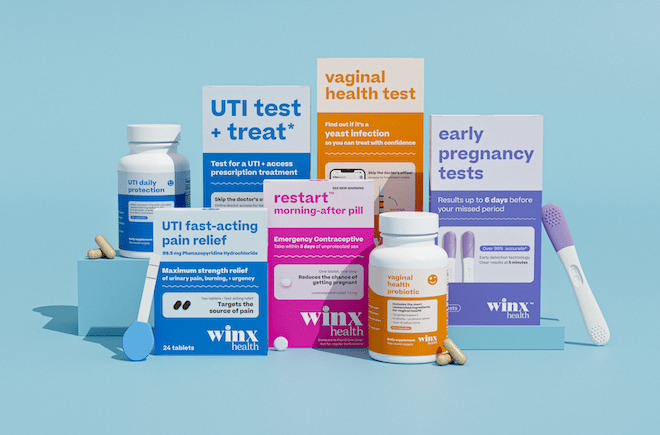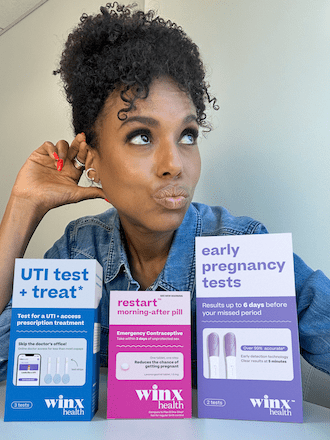By now, Cynthia Plotch is a pro at telling the story of how she went to buy a pregnancy test and ran into her boyfriend’s mom.
It was, as you can imagine, awkward — even though that boyfriend is now her fiancé. She can laugh when she tells the story now (she was in the Elixr coffee shop in Center City when we chatted over Zoom). “But at the time, I was totally humiliated and devastated,” she says. She ended up calling Jamie Norwood, a close friend and colleague, in tears immediately after it happened.
The experience was embarrassing enough to make Plotch want to ensure other women never had to go through something similar. Working out of her Philadelphia apartment, she and Norwood founded their company, originally named Stix, recently renamed Winx Health, in 2019, to destigmatize and demystify women’s vaginal and sexual health products.

They started off selling direct-to-consumer pregnancy tests, but have since expanded into ovulation tests, UTI and yeast infection tests and treatments, emergency contraception and other vaginal and sexual health products.
At a time when reproductive health has been under attack nationwide, the company is poised to expand its reach. Winx has raised about $8 million from investors, including actress Kerry Washington, and this spring the company partnered with GIANT to bring their products to over 200 stores.
The pregnancy test that doesn’t care if you don’t want to be pregnant
When Norwood and Plotch started Winx, they were on the founding team of Hungry Harvest, a direct-to-consumer, subscription service for ugly produce. But the two first met when they were working as Venture for America Fellows right after college. The nonprofit, founded by entrepreneur and former Democratic presidential candidate Andrew Yang, pairs recent graduates with startups. Plotch and Norwood were both passionate about entrepreneurship, and starting a business together seemed like a natural next step.
“We loved working together,” Plotch says. “We knew that we wanted to start a company, and we knew that we wanted to work together.”
In the early days of the business, Norwood and Plotch spent a lot of time talking to friends, former colleagues, and sometimes women on the street about their experiences using pregnancy tests and other sexual health products.
They had both felt a lot of shame and confusion around these items — and not only because of Plotch’s embarrassing drugstore run-in with her future mother-in-law. Norwood once got a bad UTI while visiting Mexico and struggled to know how to treat it abroad. In pain and struggling during a mountain hike, her guide said he knew how to help. He then poured tequila on her head. Norwood still doesn’t know what he thought this would do. “I don’t drink,” Norwood says. “That made it all so much worse.”
Around the time Roe was overturned, Norwood and Plotch began distributing an emergency contraception pill called Restart — because, seriously, buying a pill called Plan B sucks.
As they talked to dozens of women, they found their own experiences weren’t unique. Many felt shame and embarrassment while trying to buy these products. Others felt frustrated that ads for pregnancy tests predominantly feature women who are excited about a positive result. Advertisements featuring women who don’t want to be pregnant have been praised as “revolutionary,” even though one survey found that 67 percent of women between 18 and 44
“A lot of what we heard in those early days was about how difficult the experience was,” Norwood says. “It was more about the brands that existed, the price point, shopping in person at a store, especially for people that lived in smaller towns, in more rural areas, where there is shame in buying these products.
“The reality for tons of people is that when they’re buying these products, they’re scared that they’re going to run into someone, or that they’re going to be judged or perceived in a certain way.”
Within eight months of launching the business, they had a pregnancy test, with neutral, discreet packaging to market. They called the business Stix, since the pregnancy test was their first product. In 2020, Norwood joined Plotch in Philly (Norwood now lives in NYC) and the two women operated the company largely out of their apartments.
They rebranded to Winx Health this month to reflect their broader product offerings. The name is a play on the verb “wink,” which is meant as “a gesture to let people know that we’re in their corner,” Norwood says. “Part of Winx is being louder and bolder about these things.”
Sex education as a priority
For Winx, part of being louder and bolder about vaginal and sexual health is making sure women know how to use these products and take care of their bodies. That starts with access to adequate sexual health education, which — let’s face it — is abysmal in the United States.
Between 2015 and 2019 only 53 percent of female and 54 percent of male adolescents aged 15-19 reported receiving sex ed that met minimum standards, according to the Guttmacher Institute, a research and policy organization that advocates for sexual and reproductive health rights worldwide. The advocacy group SIECUS: Sex Ed for Social Change reports that 17 states provide abstinence-only sex ed and 35 states require schools emphasize the importance of abstinence in their curriculums.
When women don’t learn about how to take care of their vaginal and sexual health, they can find themselves standing in a drug store aisle, panicking about what’s happening with their bodies. Tests and over-the-counter products for yeast infections and UTIs can be confusing.
Winx aims to make all of this easier by providing sexual and vaginal health education through their blog, Real Talk. The blog started with Norwood answering common customer service questions but has evolved. Now a video series, “Everything you Wish you *Actually* Learned in Sex-Ed,” and more than 500 medically-reviewed articles educate people on topics ranging from having sex with a UTI to updates on state abortion bans.
Around the time Roe was overturned, Norwood and Plotch began distributing an emergency contraception pill called Restart — because, seriously, buying a pill called Plan B sucks.
“We say we answer your most Googled health questions,” Norwood says. “Sex education has been a big, big priority of ours since really day one.”
The push for education is also folded into the products themselves. Winx pregnancy tests have a QR code on the side of the box that takes you to a site which explains that the test detects a hormone called “human chorionic gonadotropin” that starts to show up in a woman’s body 10 days after a fertilized egg implants in her uterus. The box itself has clear instructions for use.
For their UTI test and treat product, users get results digitally by using a QR code to upload a photo of the test. If the test is positive, they have the option to connect with a doctor via text to get a prescription to treat it for $15. Winx’s Vaginal Test, which helps users determine if they have a yeast infection or bacterial vaginosis, works the same way.
For Caroline Lewis, an investor in the company who is also managing partner of Rogue Women, a venture fund that invests in women-led tech startups, the emphasis on education is part of what helps Winx stand out in the market. She’s used their products, recommended them to friends and constantly sends people Real Talk articles.
“The vaginal treatments that my mom used when she was a teenager are still the same exact ones that are on the shelf and oftentimes, there’s no education about it. It’s not easily accessible. It’s kind of embarrassing to get, and you’re not even sure when to use those products,” Lewis says. “I really liked that [Norwood and Plotch] weren’t just approaching the market from a product only perspective, but truly thinking about it in terms of accessibility, as well as education about how and when to use those products in a way that felt very approachable and trusted … especially on such sensitive topics for women.”

Sexual and vaginal health products for all
Last year, Winx reached their first profitable quarter, and Norwood was recognized as one of Forbes’ 30 Under 30 for her work with the brand. Actress Kerry Washington, who has spoken openly about her abortion, joined the team as an investor.
The company now has three employees. They work with partners both in the states and overseas to make the tests. Their fulfillment center is in Reading. They’re excited to expand their products to retail this year. Plotch, a Philly native, is especially proud to partner with GIANT, the Carlisle, PA-headquartered supermarket.
“The reality for tons of people is that when they’re buying these products, they’re scared that they’re going to run into someone, or that they’re going to be judged or perceived in a certain way.” — Winx Health Co-founder Jamie Norwood
“Our goal has always been to continue to meet women where they are and where they need us. So in the beginning for us it meant partnering with companies like Gopuff and DoorDash. As soon as women needed a morning after pill or a pregnancy test or UTI kit early, we could be there for them,” Plotch says. “But the majority of women are still shopping for these products in-store. In order to really solve their problem, that’s where we have to be.”
Winx’s growth comes at a time when women’s sexual health is under attack. Since the overturning of Roe v. Wade in 2022, 14 states have total abortion bans and 27 more have bans based on varying gestational durations. The Supreme Court recently rejected a case that would have restricted access to abortion pills, but the right to abortion remains under threat.
Around the time the decision was overturned, Norwood and Plotch began distributing an emergency contraception pill called Restart — because, seriously, buying a pill called Plan B sucks. It’s the same drug as in Plan B and other OTC emergency contraception pills, but with a name that doesn’t imply irresponsibility. They also launched an emergency contraception donation bank for Restart which has given out more than 30,000 doses since Dobbs.
“People felt really helpless and wanted to do something, but didn’t know what to do.
We wanted to create a really attainable way to make a difference,” Norwood says. “We’re really excited for us to show up where it matters, and just continue doing the work we’re doing.”
This piece is part of a year-long editorial series looking at innovations to address inequities in women’s healthcare, sponsored by Independence Blue Cross.

![]() MORE FROM OUR SERIES ON CLOSING THE HEALTH DIVIDE
MORE FROM OUR SERIES ON CLOSING THE HEALTH DIVIDE



